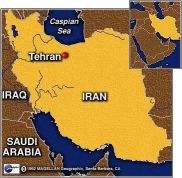Related series by DeepJournal: The Other Face of Barack Obama.
-
By Daan de Wit
Translated by Ben Kearney
The battle against Iran has already begun. War is only one phase of this process - just as it was with Iraq. The preparation is the most important part of the battle. Whoever thought that the preparation for war ended when Barack Obama took office is advised to take note of the views of critical thinker Noam Chomsky in the previous installment of this DeepJournal series. He says that Obama's policy on Iran is a continuation of the policy of his predecessor, President Bush.
Anyone who cares to look at the facts will see that he is right.
 Earlier this week the Sunday Herald wrote that the U.S. has shipped hundreds of powerful so-called bunker buster bombs from California to the British island of Diego Garcia in the Indian Ocean 'in preparation for a possible attack on Iran'. The newspaper writes: 'Experts say that they are being put in place for an assault on Iran's controversial nuclear facilities. There has long been speculation that the US military is preparing for such an attack, should diplomacy fail to persuade Iran not to make nuclear weapons'.
Earlier this week the Sunday Herald wrote that the U.S. has shipped hundreds of powerful so-called bunker buster bombs from California to the British island of Diego Garcia in the Indian Ocean 'in preparation for a possible attack on Iran'. The newspaper writes: 'Experts say that they are being put in place for an assault on Iran's controversial nuclear facilities. There has long been speculation that the US military is preparing for such an attack, should diplomacy fail to persuade Iran not to make nuclear weapons'.
One of the experts consulted is Dan Plesch, director of the Centre for International Studies and Diplomacy at the University of London, co-author of a recent study on US preparations for an attack on Iran. He says: 'They are gearing up totally for the destruction of Iran'. Plesch adds: 'The US is not publicising the scale of these preparations to deter Iran, tending to make confrontation more likely'. The shipment 'includes 195 smart, guided, Blu-110 bombs and 192 massive 2000lb Blu-117 bombs'.
According to another newspaper, the shipment was intended for Israel, but delivery of the weapons was delayed in order to put pressure on the Israeli government. Plesch hits the nail on the head when he says that America 'is using its forces as part of an overall strategy of shaping Iran's actions'. Because no matter what, the ultimate destination for the explosives seems to be Iran.
Obama preserves Bush program to undermine Iran
But Iran is actually already finding itself under fire. This is clear from revelations made by two employees of the National Security Council during the Bush Administration. They write in the New York Times about a large-scale program that was started under George W. Bush, and in quiet was kept alive by President Obama. It's a program worth approximately 400 million dollars that is intended to undermine the Iranian regime with among other things terrorist acts, many of which have already taken place in Iran.
 The program was dealt a blow recently when the terrorist Abdolmalek Rigi was arrested. Rigi was the leader of the Jundullah terrorist organization. Rigi's brother, likewise a member of Jundullah, was arrested earlier. The BBC writes: 'Jundullah has launched several deadly attacks in recent years in the south-east of Iran in protest at the discrimination of Sunni minorities in Iran. The attacks include the killing of six senior commanders of Iran's elite Revolutionary Guard in October'.
The program was dealt a blow recently when the terrorist Abdolmalek Rigi was arrested. Rigi was the leader of the Jundullah terrorist organization. Rigi's brother, likewise a member of Jundullah, was arrested earlier. The BBC writes: 'Jundullah has launched several deadly attacks in recent years in the south-east of Iran in protest at the discrimination of Sunni minorities in Iran. The attacks include the killing of six senior commanders of Iran's elite Revolutionary Guard in October'.
Iranian commandos forced the plane that Rigi was flying in to land in Iran. Rigi later said on Iranian television that he was en route to a meeting at an American base in Kyrgyzstan with 'a high-ranking person'. Rigi also said: 'The Americans said... that we don't have a problem with al-Qaeda or the Taliban, but the problem is Iran and we don't have a military programme against Iran. [...] They [Americans] promised to help us and they said that they would co-operate with us, free our prisoners and would give us [Jundullah] military equipment, bombs, machine guns, and they would give us a base'. The self-explanatory denial from the U.S. raises the question as to whether Rigi told the truth or whether his statements came as a result of (the threat of) torture.
In reference to Rigi's arrest, the press agency AFP writes: 'Iran says Jundallah receives backing from the intelligence services of Pakistan, Britain and the United States, a charge those countries strenuously deny'. This is not the best possible way to reflect reality. The report could have mentioned that an investigation by ABC News found that Jundullah was being financially supported by the U.S. ABC News writes: '[...] the United States has supported and encouraged an Iranian militant group, Jundullah, that has conducted deadly raids inside Iran [...]'.
AFP could have also quoted former CIA agent Phil Giraldi. Or Selig S. Harrison. Harrison writes in Le Monde Diplomatique about the 'well-established US ties with Pakistan's Interservices Intelligence Directorate (ISI) and the Israeli intelligence agency Mossad. The ISI channelled weapons and money to an already established Iranian Baluch dissident group, Jundullah (Soldiers of God), which inflicted heavy casualties in raids on Iranian Revolutionary Guard units in Zahedan and southeast Iran in 2006 and 2007. The US made no effort to hide its support for Jundullah. On 2 April 2007, Voice of America radio interviewed its leader, Abdolmalek Rigi, introducing him as “the leader of the popular resistance movement of Iran.”'
 Harrison writes: 'Several of my Baluch contacts recently provided detailed proof of Rigi's ISI ties'. Famed investigative journalist Seymour Hersch also wrote about Jundullah in connection with the increasing 'secret moves against Iran' in 2008. And about another terrorist organization sponsored by the U.S. - the Mujahedin e-Khalq (MEK).
Harrison writes: 'Several of my Baluch contacts recently provided detailed proof of Rigi's ISI ties'. Famed investigative journalist Seymour Hersch also wrote about Jundullah in connection with the increasing 'secret moves against Iran' in 2008. And about another terrorist organization sponsored by the U.S. - the Mujahedin e-Khalq (MEK).
Preparatory struggle for the 'hearts and minds'
Terrorist attacks carried out in Iran under contract for the U.S. are part of a broad palette of actions aimed at regime change in Tehran. The palette consists of, among other things, attacks, military preparations, the support of the Iranian opposition, sanctions, diplomatic pressure, 'threats, constant, verbal, actual' - which Chomsky talks about in part 31 of this series - the Office of Terrorism and Financial Intelligence (see part 33) and the never-ending stream of reports in the media that keep Iran at the top of the agenda, which has worked to convince seven out of every ten Americans that Iran has nuclear weapons, according to a CNN poll.
These are all elements of the fight against Iran, an island in a sea of American interests. The biggest fight of them all is for the 'hearts and minds' of the public.

 mail dit artikel
|
mail dit artikel
|
 print
|
print
| 
 | DeepJournal
| DeepJournal
 Earlier this week the Sunday Herald
Earlier this week the Sunday Herald  The program was dealt a blow recently when the terrorist
The program was dealt a blow recently when the terrorist  Harrison writes: 'Several of my Baluch contacts recently provided detailed proof of Rigi's ISI ties'. Famed investigative journalist Seymour Hersch also
Harrison writes: 'Several of my Baluch contacts recently provided detailed proof of Rigi's ISI ties'. Famed investigative journalist Seymour Hersch also